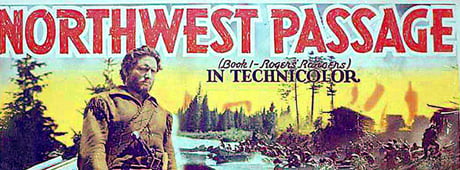No products in the cart.
Payette Passage

A Thirties Bonanza
By Gary Oberbillig
My family stories have it that Spencer Tracy wasn’t all that happy when Hollywood came to McCall to make the epic film Northwest Passage back in 1939. The Great Depression had been throttling the country for a decade, and the contrast between the “haves” of Hollywood and the “have nots” of small-town Idaho would have been considerable. My folks said the depression didn’t end for them until the United States entered WWII, when the wartime industry ramped up and Idaho became a breadbasket to help feed the effort. Consequently, Spencer might have felt leery not only of the struggling town but also of the wild adulation he reportedly received when he stepped off the train from Boise on June 29, 1939. According to the Payette Lake Star, one woman even remarked, “If I only had had a pair of scissors, I could have cut off a piece of his coat for a souvenir.”
Our family’s source for insider tidbits about the movie was my uncle Theodore “Ted” Turner, who was an extra as a Rogers Ranger under Spencer’s command. He performed in the fight scenes and perched in downed trees after wading through swamps, along with whatever else was required for the cameras. Uncle Ted was an out-of-work logger who had lost an eye a decade earlier, when he was a teenager, and the pain still plagued him. The film’s extras were paid five dollars per day with a box lunch included, plus an additional five dollars if the extra grew a beard. Ten dollars a day in those lean times would have been a bonanza, especially considering that a loaf of white bread cost nine cents and a pound of sliced bacon was thirty-seven cents.
Not everyone in McCall was poor but the injection of Hollywood’s wealth and glamour must have been particularly welcome to those who were hard up. The Boise Statesman reported that MGM‘s projected budget for the film was a cool two-and-a-half million dollars. This was very expensive for its time and later estimates had it that a half-million dollars were injected into the McCall economy. Ultimately, the movie lost $885,000.
This content is available for purchase. Please select from available options.
Register & Purchase Purchase Only
Register & Purchase Purchase Only

